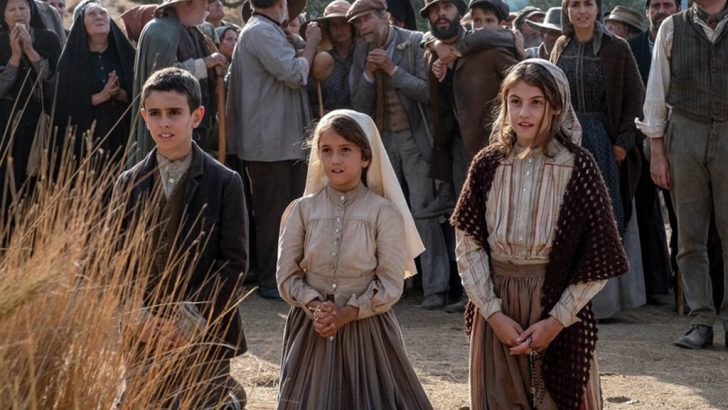You may have been reading about Fatima, a film that deals with the Fatima apparitions, in recent months. Its release was delayed due to the coronavirus, but this wasn’t seen as a problem by its producer, Natasha Howes.
“People have more time to listen to the story now,” she says. Its release in 2020 is timely for another reason: it’s the centenary of the death of St Jacinta, one of the visionaries.
Howes came to it with an impressive pedigree, having researched a Fatima documentary made in 2009, The 13th Day. That film, she feels, was for a “devotee audience”. This one is more universal. It’s targeted towards “people of all faiths and none, towards rationalist and scientists”. Heaven, she asserts, “didn’t just proclaim itself to Catholics on that October day”.
Directed by Marco Pontecorvo, Fatima stars Alba Baptista, Stephanie Gill, Lucia Moniz, Joaquin de Almeida, Harvey Keitel and Goran Visnic. Joana Ribeiro plays Our Lady.
The film recounts how a 10-year-old shepherd girl and her two cousins in the Portuguese village of Fatima report having seen multiple visions of a woman who’s “brighter than the sun”. They say she advised them to devote themselves to the Holy Trinity. If they say the Rosary daily it will help end World War I.
Their revelations meet with scepticism by both clerical and secular forces. (“It could be the devil. He often disguises himself.”) They’re asked to renege on their story but they refuse. As word of it spreads, thousands of pilgrims flock to the location to in hope of witnessing a miracle.
The film doesn’t stint on budget. It has epic proportions. Using a biography of Sr Lucia as its source, it was produced in conjunction with an organisation called The Shrine of Our Lady of Fatima, which advised on its content.
One of its ambitions was to correct the misrepresentation of Sr Lucia’s mother. This was a problem in previous films about the apparitions. She had trouble believing her daughter – “why would she choose you?” she says disparagingly. But there’s more to her than this, she was a devout woman, a catechist.
Depiction
The depiction of Mary is more flesh and blood than ethereal. Her maternal nature makes it easier to understand how the children bonded emotionally with her.
The film will be welcomed by those who’ve waited patiently for it to get here. It’s a visual extravaganza. Andrea Bocelli also performs a song in it, Gratia Plena (Full of Grace).
Other films about Fatima that you may wish to see (or re-see) on this theme are, The Miracle of Our Lady of Fatima (1952) and Apparitions of Fatima (1992). The latter is regarded as the most historically accurate film on the Fatima theme. It’s screened daily for pilgrims to the village in over a dozen languages.
The 13th Day is narrated in flashback form. Most of it is shot in black and white but as the Blessed Virgin appears it bleeds effectively into colour.


 Aubrey Malone
Aubrey Malone The three young visionaries as depicted in Fatima.
The three young visionaries as depicted in Fatima. 